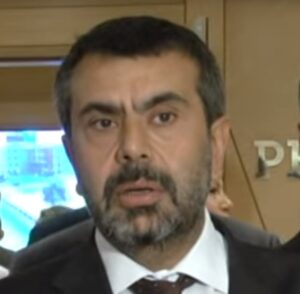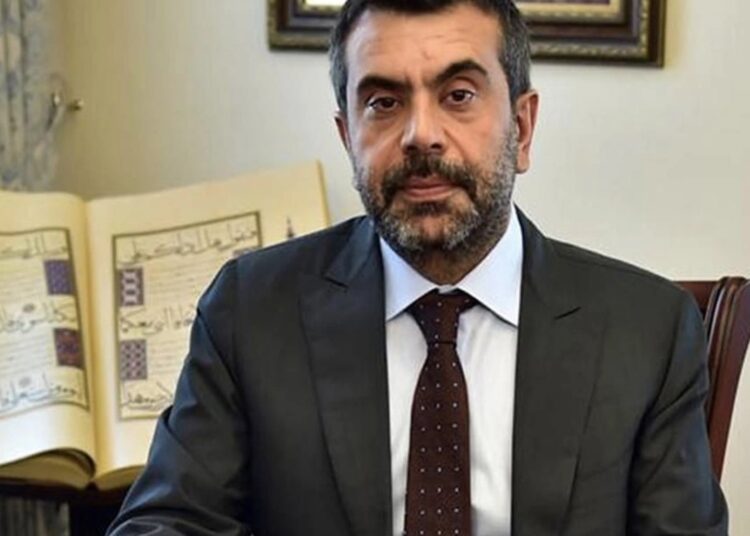Abdullah Bozkurt/Stockholm
Yusuf Tekin (50), the recently appointed minister of education, responsible for overseeing the education of nearly 20 million children in Turkey and entrusted with billions of Turkish lira to carry out that task, was red-flagged during a counterterrorism probe into the Islamic Revolutionary Guard Corps (IRGC) Quds Force network, classified documents obtained by Nordic Monitor have revealed.
Tekin’s links to Quds Force operatives in Turkey were exposed during a confidential, multi-year probe into the group, known by its Turkish name, Tevhid Selam. Tekin’s communications with a specially trained Iranian operative were intercepted between December 15, 2012 and November 22, 2013, and the wiretaps were entered as evidence into the case file.
The investigation launched in 2011 by Istanbul prosecutor Adem Özcan under case file No.2011/762 identified 232 Turkish and Iranian suspects, some later designated by the US Treasury under sanctions, after painstaking surveillance of operatives, wiretapping of their phones and internet communications and a review of the shell companies that were used as covers to mask secret operations. The prosecutor’s probe lasted until 2014 before then-prime minister and now president Recep Tayyip Erdogan stepped in to kill the country’s most comprehensive counterespionage investigation in its recent history.
The case file contains 10 intercepted phone and SMS conversations between Tekin and Furkan Torlak (37), a known Iranian asset who was working as an advisor to Numan Kurtulmus, the then-deputy chairman of the ruling Justice and Development Party (AKP) and now the speaker of parliament. Torlak was a suspect and a target of the investigators, with the conversations revealing a close relationship between Torlak and Tekin, who was serving as undersecretary of the Ministry of Education at the time.
Wiretap secured by a judge’s approval in the IRGC Quds Force investigation reveals close links between Yusuf Tekin and Furkan Torlak:
The content of these conversations suggests that Torlak was introducing his associates to Tekin and arranging meetings with him. One of the individuals Torlak introduced to Tekin was Yahya Bostan, who was also a suspect in the Quds Force probe. In a call on May 16, 2013 Torlak described Bostan as his roommate and a member of the same community, referring to a group of Islamists who promote the Iranian mullah ideology in Turkey.
Bostan currently works as the news coordinator for the state-run Anadolu news agency, but his real job is listed with Turkish intelligence agency MIT, which uses journalism as a cover to run clandestine operations. He had previously worked as news coordinator for TRT News between 2017 and 2021. Before moving to the state-funded media, he was employed by the Sabah newspaper, owned by the Turkish president’s family. Bostan often writes articles praising MIT in his weekly column for the Islamist Yeni Şafak daily.
Judging from the content of the wiretap, Bostan and Torlak had known each other for a long time, possibly going back to their younger years when Torlak had been groomed at an Iranian-run Shiite ḥawzah (seminary) in Syria from 1997, when he was 12, until he turned 21. Turkish police tracked all of Torlak’s visits to Syria, where he had spent his teenage and early adult years under the supervision of his handlers from the Quds Force.

A wiretap dated January 15, 2013 shows the two had worked together in the recruitment of an acquaintance for the ruling party, using favors to fast-track the candidate’s employment. Another wiretap dated November 21, 2013 reveals Tekin was sharing confidential government information from the ministry with Torlak by sending documents to his Yahoo email. Torlak had no official position in the government and did not have a clearance to gain access to government information.
Tekin is not the only one Torlak sourced to get his hands on government information. He was also using his wife, Sümeyye Nur Torlak, the daughter of Burhan Kavuncu, one of the leading figures in establishing the Iran-backed Hizbullah in Turkey. Kavuncu helped Torlak land advisory positions in the government as well as in the ruling AKP. He currently works as an advisor to the culture and tourism minister. His connections to the Quds Force came to light one-and-a-half years after the probe was launched, prompting the prosecutor to secure a warrant to wiretap his phone and place him under surveillance.
The wiretaps show that Torlak obtained classified documents illegally through his wife Sümeyye, who was working for the Public Security Institution (Kamu Güvenliği Teşkilatı) at the time. In the wiretap his wife told him that if she sent classified material through the mail, the government might be able to identify her as the leak. Instead, she said she would bring the hard copies home to avoid detection.
Another wiretap between Yusuf Tekin and Furkan Torlak:
The investigation also revealed how Torlak hid his activities and education in Syria in the CVs he submitted to support his employment in government agencies at the recommendation of Sefer Turan, another suspect in the Quds Force probe. He did not want to raise red flags during background checks. Turan, currently serving as chief advisor to President Erdogan on Turkey’s relations with Arab and Muslim states, especially in the Middle East and North Africa, had worked for the Iranian-financed radical publication Yeryüzü in the 1990s promoting the Iranian mullah regime.
How the entire operation unmasked Torlak’s hidden background and his connections to Quds Force operatives was revealed during a hearing on May 31, 2018 at the Istanbul 14th High Criminal Court by Selman Yuyucu, a police chief who had worked the Quds Force investigation.
Another wiretap between Yusuf Tekin and Furkan Torlak:
Tekin’s appointment as minister of education on June 4, 2023 means that he is now responsible for overseeing the entire public education system in Turkey. This vast system employs 1.1 million personnel, predominantly teachers, who work under his leadership to educate children from kindergarten to 12th grade. Additionally, the ministry has a global presence, with education attachés reporting directly to Tekin from Turkish embassies in 63 countries.
The ministry accounts for a significant portion of the central budget, which was 285 billion Turkish lira at the end of 2022. Moreover, it allocated 2.3 billion Turkish lira for overseas operations during the same period. With its authority to license, inspect and utilize administrative tools, the Ministry of Education also exerts considerable influence over private schools, including minority schools.
According to the ministry’s official records, 19.2 million children were educated during the 2021/2022 school year, including 732,000 Syrian refugees between ages of 5 and 17 in various schools, corresponding to 65 percent of all Syrian youngsters of school age. Each year, the ministry publishes 300 million school textbooks, which it distributes to schools after it has monitored their content.













